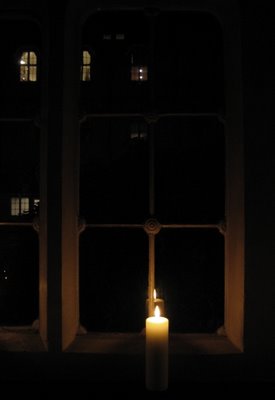Like so much else connected with Christian festivals, the word ‘advent’ itself is of pagan origin since many pagan societies annually commemorated a certain date each year when one of their gods came and took up temporary physical dwelling in his or her temple.
The feast held in honour of this manifestation was called ‘adventus’, and on that day the temple, which was normally closed, would be opened for public adoration. All of which made it a useful word for the medieval church to describe the concept of God visiting the world and taking up residence within the ‘temple’ of a human body.

Whether or not you believe in the Christian origins for the festival of Christmas, there is a rich beauty and a primitive mystery in it’s telling - at least, in the way it was told in the centuries before the secular seduction of the season.
The following advent carol, for example (rendered here in modern English), was penned some 800 years ago…
Gabriel, from heaven’s King
Sent to the maiden sweet,
Brought her this blissful tiding
And warmly gave her greet:
“Hail to thee, full of grace aright!
For God’s Son, this heavenly light,
For love of man
Will man become
And take
Flesh of thee, maiden bright,
Mankind free to make
Of sin and devil’s might.”
The mild maiden softly gave
Answer to him then:
“However should I bear
A child without a man?”
The angel told her: “Dread thee naught;
Through the Holy Ghost shall be wrought
This very thing
Of which tiding
I bring;
All mankind shall be bought
Through thy sweet birthing
And out of pain be brought.”
When the maiden understood
And the angel’s words had heard,
Tenderly, with gentle mood,
The angel she answered:
“Our Lord’s servant girl I know
I am, who is above us here.
As for me,
Full furthered be
Thy words:
That I, since it His will is,
A maiden, outside [natural] law,
Should have a mother’s bliss.”
With that the angel went away
All out of her sight.
Her womb began to rise
Through the Holy Ghost’s might.
Into her was Christ placed anon,
True God, true man in flesh and bone,
And of her flesh
A-borne he was
In time,
Through which came God to us to dwell;
He bought us out of pain,
And let himself for us be slain.
Maiden mother matchless,
Of mercy full abounding:
Pray for us to him that chose thee,
To him who in thee grace found,
That he forgive our sin and wreck;
And clean of every guilt us make;
And heaven’s bliss,
When our time it is
To die,
Give us, for thy sake:
So to serve him here
That he us to him take.
I am indebted for this poem to The Socinian who sagely asks: “What can we learn from the Christian season of Advent, if we don't accept as literally true the historical events upon which its religious meaning is built? Perhaps it is that underneath the questionable historicity of the Advent mythology nevertheless stands a solid truth: that when your cup seems emptiest is right before it's about to be filled.”

[Images: © Brian Sibley, 2006]
There is the first of a series of Advent windows on Window Gazing .
3 comments:
As usual, your blog is a mine of fascinating information. Although, if I had given it a bit of thought, I probably would have guessed that the word came from Pagan times!
Being Jewish the only thing I knew about Advent, until now, was that there were great calendars with windows to open and - sometimes they had chocolates inside!
Not sure you should be allowed to eat them really... ;-)
Post a Comment